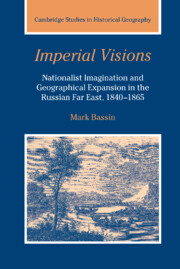 Imperial Visions
Imperial Visions Book contents
- Frontmatter
- Contents
- Foreword by Nicholas V. Riasanovsky
- Acknowledgments
- Map of the Russian Far East (c. 1860)
- Introduction
- Part I
- Part II
- Introduction
- 5 Dreams of a Siberian Mississippi
- 6 Civilizing a savage realm
- 7 Poised on the Manchurian frontier
- 8 The Amur and its discontents
- Conclusion
- Bibliography
- Index
- Cambridge Studies in Historical Geography
8 - The Amur and its discontents
Published online by Cambridge University Press: 06 July 2009
- Frontmatter
- Contents
- Foreword by Nicholas V. Riasanovsky
- Acknowledgments
- Map of the Russian Far East (c. 1860)
- Introduction
- Part I
- Part II
- Introduction
- 5 Dreams of a Siberian Mississippi
- 6 Civilizing a savage realm
- 7 Poised on the Manchurian frontier
- 8 The Amur and its discontents
- Conclusion
- Bibliography
- Index
- Cambridge Studies in Historical Geography
Summary
“A malignant ulcer”
At the end of the 1850s, amidst the excitement and optimism about the annexation of the Amur which we have been considering, a very different tone began to be heard in the discussion of the region and river. This was a tone not only of reservation, but even of incredulity in regard to the the dizzying vistas which were being depicted for the reading public of the country. It was not so much the acquisition as such of the far-eastern territories as such which was called into question – although this was something of an issue as well, as we will see – but rather the way in which the entire process was being handled, and in particular the careless and simple-minded exuberance with which the affair was being presented to the rest of the country. An officer who had taken part in establishing the first settlements on the Amur complained bitterly in a letter from Moscow back to Eastern Siberia about the “lies and boasting” and the “fallacious information” which newspapers and magazines in the nation's capital were disseminating about affairs in the Far East. Other critics expressed their consternation more publicly. In one of his earliest essays, the Siberian historian and ethnographer Nikolai Iadrintsev – a committed regionalist and sensitive in any event to the way Russians west of the Urals viewed his homeland – spoke mockingly about the promoters or “panegyrists” of the Amur.
- Type
- Chapter
- Information
- Imperial VisionsNationalist Imagination and Geographical Expansion in the Russian Far East, 1840–1865, pp. 233 - 273Publisher: Cambridge University PressPrint publication year: 1999


